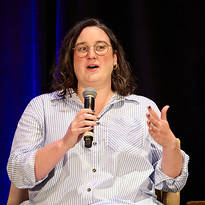The California Legislature is advancing a proposal to make the state the first to permanently enshrine into law a movement known as "food as medicine." Almond and pistachio growers see the legislation as an opportunity to connect local agriculture to nutrition incentives.
By integrating nutritious foods into healthcare, advocates hope to improve health outcomes for low-income communities. The concept of tailoring meals to patient needs dovetails with the state’s drive for sourcing locally produced foods for food banks and schools and rides on federal support for food boxes during the pandemic.
“Some people might think of a diet tea they saw on Instagram or maybe it’s a particular juice cleanse,” said Katie Ettman, deputy director at Fullwell, a public policy group focused on food insecurity, in a panel discussion at this year's Agri-Pulse Food & Ag Issues Summit. “When we talk about food as medicine, one of the things I like to prioritize is that this is food to help prevent, reverse and treat chronic disease.”
Through Medicaid, the federal government has granted waivers to several states for pilot programs testing innovative ways to provide healthcare.
California’s waiver, known as CalAIM, allows insurance providers—such as Anthem, Kaiser and county plans—to offer a range of medically supportive meal options. According to Ettman, a patient with diabetes could receive a produce box as part of the treatment.
“A low-income person who might not otherwise be able to access fresh fruits and vegetables can now get them paid for with healthcare dollars,” said Ettman.
 Katie Ettman, Fullwell
Katie Ettman, FullwellYet the federal waivers last just five years and policy advocates have been pushing lawmakers to establish long-term financial support for CalAIM to extend beyond 2026. Ettman has partnered with Assemblymember Mia Bonta of Oakland and the San Francisco-based Food As Medicine Collaborative to craft Assembly Bill 1975.
By transitioning the service to permanent benefits under Medicaid, Ettman hopes the bill will seize on national momentum sparked after the White House hosted a major anti-hunger conference in 2022.
“Food is life. Food is sustenance. Food is medicine,” said Bonta, during a committee hearing on AB 1975.
An uncommon alliance of advocacy groups is supporting the measure, putting the Almond Alliance and American Pistachio Growers in partnership with Pesticide Action Network North America.
It’s easy to be “in the know” about what’s happening in Washington, D.C. Sign up for a FREE month of Agri-Pulse news! Simply click here.
Bonta’s first attempt with the legislation failed to get past the Assembly Appropriations Committee last year, one of many bills stalled in the fiscal gauntlet as the state began to grapple with a record budget deficit. In 2022 Bonta’s husband, California Attorney General Rob Bonta, had attempted a similar measure aimed at medically supportive food assistance when he held what is now Mia Bonta’s seat.
To convince lawmakers to finance such a program, Ettman is making the case that prescription food plans are often the same price or cheaper than the long-term costs for treating chronic diseases. She has pulled farm interests on board by highlighting the potential for a new revenue stream.
“Often the patients we are targeting are also low income,” said Ettman. “You are increasing their purchasing power. So there is more money flowing through the system that can support our retailers and our agricultural producers, etc.”
A provision in AB 1975 would establish an advisory committee, with a member from the agriculture community.
“We have all of the building blocks here,” she said. “We have incredible physicians who want other people to know about these. We have program providers. We have people working in hospitals who wants to make sure we see dietary change. We have so much research.”
One of those building blocks is SunTerra Produce, a grower, packer and shipper of fresh fruits and vegetables based in Brawley. It was active in USDA’s Farmers to Families Food Box Program and has expanded on the effort since then, contracting with a Medicare plan to deliver medically tailored meals in 15 counties.
“We really are excited to partner with growers on this initiative,” said founder Steve Brazeel at the summit. “Farmers and local communities get a chance to participate, to have a seat at the table when it comes to the healthcare costs that impact all of us.”
Research into the pilot projects has shown promising results. An initiative known as Alameda County Recipe4Health has been equipping safety net health providers with prescribed produce and health coaches to address chronic conditions and food insecurity.
According to Chief Medical Officer Steven Chen, the initiative has logged several positive outcomes. Two-thirds of the patients have improved their cholesterol, a third of those with diabetes have had meaningful reductions in blood sugar, food security has improved 25% and emergency room visits have dropped 15%.
Testifying in support of AB 1975, Chen added that every dollar spent on food generates $1.90 for the local economy. While 83% of the 6,000 patients in the program identify as BIPOC, Recipe4Health also sources from BIPOC farmers. Chen said the purchases support regenerative and organic farming practices to “minimize toxic pesticide residue and increase the vitamin and antioxidant content to the produce grown.”
One patient participating in the program was terrified with what she expected to be a weight loss regime but was later impressed with the nutritious food and the health and wellness coaching.
“Not only did I receive beautiful organic greens and vegetables, I learned of their nutritional value and how to incorporate them into my healthy diet In the most affordable way,” said Elizabeth Duran.
The testimony and long list of associations supporting the measure—with no opposition—has drawn bipartisan support for AB 1975 among lawmakers.
“It's amazing it took this long for us—or society as a whole—to understand how important nutritious foods are, especially in preventative medicine,” said Republican Asm. Marie Waldron of Escondido.
For more news, go to Agri-Pulse.com.


